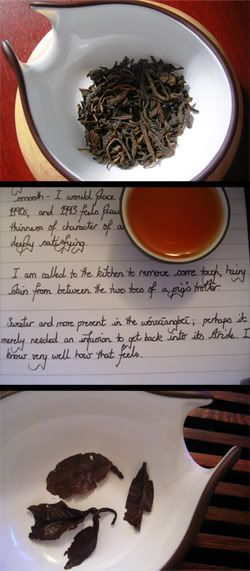
...who was later caught taking lunch with her (fairly chubby) chick outside the window:

On Patience
I recently had a good question regarding the term "patience", which I thought might be a topic of interest for other readers, as it's a word that crops up in my journals, and so in these articles.
I originally use the term as part of the vocabulary of cheese/chocolate tasting, funnily enough, and now tea. In each of these tasting spheres there is the concept of initially-sensed flavours that gradually move towards sensations at the back of the mouth.
(The initial flavours are related to the rapidly-declining notes of the beidixiang – incidentally called the "head note" in the traditions of the perfume industry. The back-of-the-mouth / nasal cavity sensations are "retro-olfactory", or "body" in perfume, and can be related to the lengxiang in tea.)
The way I’ve seen the term "patience" used is to characterise the duration of that progression through the mouth. The tacit assumption is that it is good to have a lingering, unhurried process from "lips to throat" (from "head" to "body"). Substances that are "patient" show an unhurried progression: they last a long time in the mouth. Conversely, it’s often unsatisfying when a substance "hurries" through the mouth: a quick initial flavour, some mid-flavour, then the throat (and huigan in tea).
We’ve got plenty of teas (and am sure you have, too) which rush in and rush out – often these have little "low" notes flavour, as it is these that tend to dissipate the slowest. The knowledge accrued by perfume manufacturers and wine producers over the centuries (and no doubt some tea factories) is that the "high" notes are sensed first, and dissipate first, while the "low" notes are sensed last, especially around the throat because of the interaction of the nasal cavity, and dissipate last.
In the ways I’ve seen the term "patience" used, it’s not an assessment of flavour – it’s only an assessment of the duration of the progression through the mouth. We’ve got a tea (which shall remain nameless) that has great patience in that it lingers for a long time, and yet tastes like poison. We’ve also got teas (plenty of wulong, typically) that have great, rich flavour but which have nearly no patience. Finding a "patient" wulong that still tastes good, and furthermore has the "endurance" to last many infusions, is one of my unofficial goals in tea.
Some of the best cheeses in the world (thinking epoisses, if you like cheese) have exemplary patience. A prime differentiator for spotting a factory-cheese from an artisan-cheese is in its patience – there must be parallels in tea.
It seems a fairly intuitive term. I was at a wine-tasting where one wine was described as "wonderfully patient", which the assembled host seemed to accept without question. I wonder if the Chinese term is a transliteration from the English? Or mere coincidence, perhaps.
What is your understanding of "patience", particularly when related to tea? Hopefully, this goes some way to describing its use in my tasting notes, at least.
This sample of 1993 shengpu maocha from the Davelcorp Foundation really snuck in under the radar, being an accompanying sample to the 2001 Mengku Gancang (thin-paper). And by the power of Greyskull, what decent tea it is.
DL mentioned that this was an unsung hero from a local vendor, of origin unknown.
Caledonian Springs @ 100C in 12cl shengpu pot for middle-aged shengpu; ~6-7g leaf; 1 rinse
 Dry leaf:
Dry leaf:Dark and chocolate-coloured, looking rather like dahongpao in its "huskiness". Fairly whole leaves. Some stems, a few tips, but mostly dark mid-length sections. A slightly damp aroma testifies to a little wet-storage - the overall effect is very attractive, and I chuckle aloud to myself at DL's ability to quietly sneak in great tea when you're not looking.
3s, 5s, 6s, 10s, 20s, 60s:
The first impression is the delicious beidixiang of absolute vanilla, with the complementary shicang [wet store-house] sweetness of the dry leaves.
The sensation in the mouth is ineffably smooth, with plentiful oil on the lips and tongue, and a "heavy" texture to the soup. The flavours are sweet, fairly high, and remind me of creosote and wood-stain, in an appealing way.
There's not a lot of bass, low flavours on offer, and what is present is a touch understated. It is likely that this is due to the fact that it's maocha, which I find has problems with retaining its flavour over time - it attains a richness and depth, but then begins to thin out fairly rapidly. I am reminded of the 1960s Gaoligongshan maocha - smooth and delicious, but a touch underpowered.
As with that tea, this 1993 maocha benefits from large leaf quantities and less conservative brewing: one can afford to bully the tea a bit, in order to extract the best flavour.
It lasts long in the mouth [patience!], and finishes with the combined pleasures of its woody sweetness with the shicang aroma in the nose. There is a hint of salt-like flavour in the huigan.
The time between infusions has to rapidly increase in order to keep pace with the decreased amplitude of flavour in this tea. It is like chasing a nymph that just runs faster the closer one gets, always remaining just out of reach...
Wet leaves:
Dark, but strong and healthy - they are easily unrolled. Mostly small leaves, some joined at the stems. It is not the huge, voluptuous modern maocha that we see and admire so often.
Overall:
Many thanks to DL for this sample - it was excellent. Satisfying in flavour, aroma and body, it takes leg-work to keep up with, but amply rewards while its endurance holds out.

2 comments:
I love your description of this term, and it really makes a lot of sense how you have described it. Especially your appeal to cheese, in that factory processed cheese is not patient and makes for bad pizza compared to an artisan cheese. I will be paying more attention to this in the teas I drink, not just to how the flavor evolves between brewings but also how it evolves in my mouth. The time that a flavor lasts is often not noticed since we might focus on flavor and just take another sip when the flavor dwindles, not noticing that it is an impatient tea.
A+ post!!
I've noticed that tea also makes the drinker slightly more patient. To slow down, observe the effect of the tea on the body, and notice the entire range of sensations rather than just the initial flavour certainly takes some patience - something that I find I have more of, the more tea I drink.
Toodlepip,
Hobbes
Post a Comment